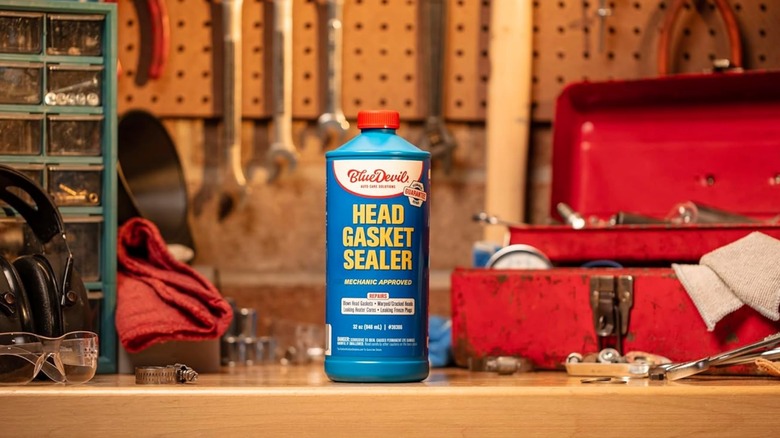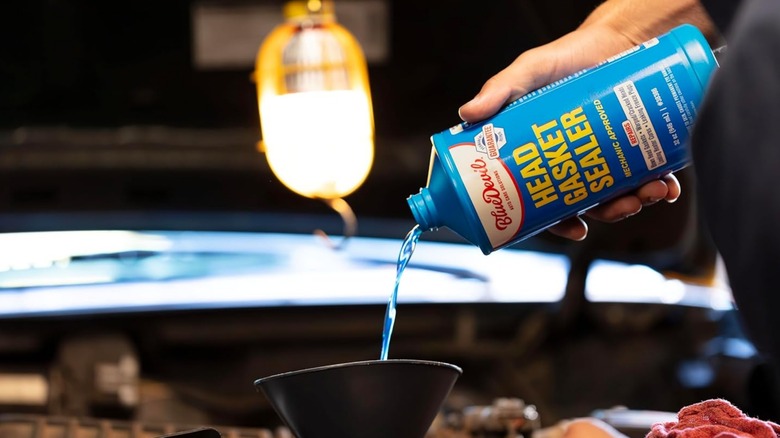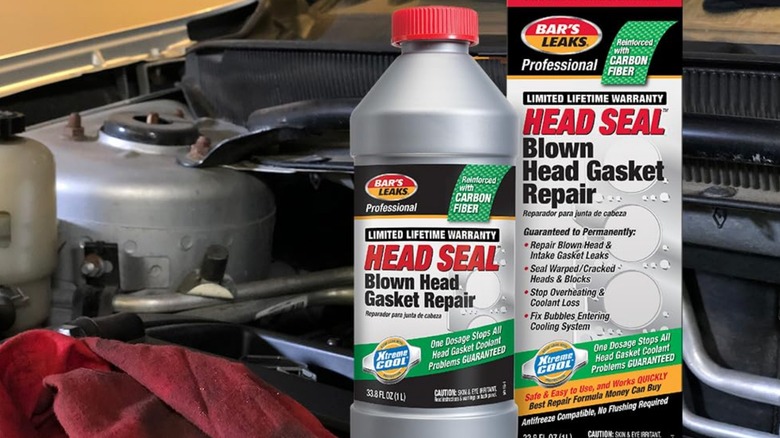What Does Head Gasket Sealer Additive Do & Which Ones Are Considered The Best (According To Users)?
We may receive a commission on purchases made from links.
Internal combustion engines are impressive machines, but they can't function on their own. Numerous vehicle systems and various automotive fluids help our cars to run properly. Many of those fluids, like engine oil and coolant, must travel continuously through the engine in order for it to continue sending you down the road. However, it's critical that those fluids do not come into contact with each other or escape their designated passages.
To keep fluids within their proper channels, automakers build engines with various gaskets or seals. Among those gaskets, one of the most important for your vehicle's health is the head gasket. The head gasket separates the engine block from the head. It's responsible not only for keeping oil and coolant within their correct passages, but also for preventing the loss of compression by sealing the cylinders to keep combustion gasses from escaping.
The head gasket has a monumentally important role. However, it's not immune to damage and wear over time. If the head gasket fails, it can allow oil, coolant, combustion gasses, or all three of those things to escape their channels, potentially leading to catastrophic engine damage. Unfortunately, head gasket replacements can be pricey. Because of this, some drivers choose to use a head gasket sealer to stop any leaks and prevent further damage. These sealers are designed to be introduced to the vehicle's cooling system and then react with the heat of the engine to patch any holes in the head gasket. However, these products can only help with some types of head gasket leaks, and even then, it's not a permanent fix. If you're interested in learning more about how head gasket sealers work, whether they're worth it, and what the best brands are, stick around. Here's the deal with head gasket sealers.
How does head gasket sealer additive work, and is it worth it?
As mentioned, most head gasket sealers are designed to work from within the cooling system. Typically, the process involves draining the radiator and refilling it with water, removing the thermostat to prevent the sealer from forming a clog, and running the engine with the heater blowing while adding a coolant and water mixture. Then, you add the head gasket sealer slowly according to the specific product instructions. Afterward, you need to drive the vehicle for roughly 30 minutes to allow the engine to get hot enough for the sealer to work.
Because the sealer is mixed into the cooling system, it can help fix small leaks between the combustion chamber and the engine's water jacket or coolant channels by reacting to the heat and plugging gaps in the head gasket. These types of leaks can cause issues like spark plug fouling due to coolant entering the combustion chamber and combustion leaks into the cooling system, potentially resulting in engine overheating issues.
However, those issues only represent a handful of the different types of head gasket leaks. Head gasket sealer cannot fix leaks resulting in oil mixing with coolant, combustion leaks between cylinders, or leaks between the cylinder head and the engine block. Head gasket sealer can be a viable, albeit temporary, fix for the types of leaks we described above, but you should get a professional inspection before using it. Doing so can help you identify the issue definitively, as other problems can present similar symptoms to those of a bad head gasket. Then, if your mechanic tells you that head gasket sealer could be a potential band-aid while you prepare for a complete replacement, you can try a sealer product.
What head gasket sealer additives are considered to be the best?
We wanted to find out what actual users had to say about these products. So, we took a look around some of the net's most popular auto repair and mechanics forums and identified a handful of brands that appear to be held in relatively high regard within the automotive community. One of the most-mentioned names we encountered was BlueDevil Head Gasket Sealer. The product is designed for engines of all types, including both gas and diesel, and contains zero particulate matter that could harm internal components. BlueDevel head gasket sealer has relatively positive reviews overall, boasting four out of five stars on Amazon based on nearly 2,500 ratings, and you can pick up a 32-ounce bottle for $64.99 normally.
While BlueDevil was the name we saw most frequently during our search, we did find a couple of other brands with which users report having positive experiences. Bar's Leaks Head Seal Repair is another brand that many commenters vouched for, and you can pick up a bottle for $32.99. It also comes with decent reviews, receiving 4.1 out of five stars based on more than 4,000 comments. The final product that several users mentioned as being successful was K&W FiberLock Head Gasket & Block Repair. You can grab a bottle for $48.00, and it has 4 out of 5 stars based on nearly 1,000 ratings.
That said, the general consensus among commentators on all of the threads we visited is that head gasket sealer isn't usually worth it. As mentioned, it's a temporary fix for only a couple of types of head gasket leaks. The best move for your vehicle and its engine's health is to replace the head gasket if it develops a leak.


